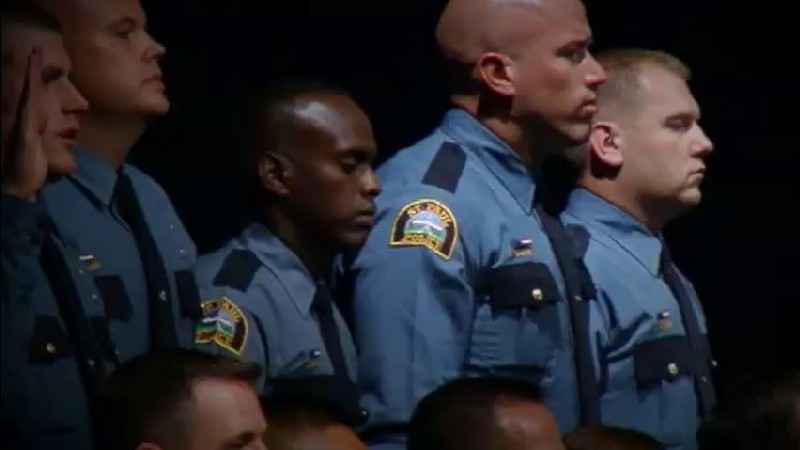Program trains St. Paul police to intervene when they see misconduct from fellow officers
[anvplayer video=”5035782″ station=”998122″]
The St. Paul Police Department is teaching its officers how to prevent misconduct and mistakes through peer intervention training.
Ethical Policing is Courageous, or EPIC, training empowers officers to step forward when they’re concerned about a colleague’s actions.
“If something is going sideways and someone is getting angry, you tap that person on the shoulder and say, ‘Hey, I got this,’” Chief Todd Axtell said. “It was very important to be able to stand in front of officers and let them know that this policy applies to me as well.”
All of the 585 officers in the department have now received EPIC training. Axtell wears a pin as a symbol of his pledge to this new policy.
“This program really embraces the fact that we’re human beings,” he said. “This also gives the opportunity for our officers to be vulnerable and that’s really something that we haven’t done a real good job of in the past, to become vulnerable enough to understand we have our limitations and when we understand our vulnerability we become better police officers.”

[KSTP]
According to Axtell, they started looking into the program in 2018. Axtell visited New Orleans with then-Deputy Chief Mary Nash to understand the training.
“We came back to St. Paul and decided to launch the program and get it going for the entire department,” Axtell said.
He said it took time to train the officers who would administer the program. It rolled out department-wide in fall 2020, just months after George Floyd’s murder.
“It did give me a sense of how important it is for every officer who wears a badge in this entire country to be empowered to be able to step in, regardless of rank or time on the job, to stop something that shouldn’t be happening,” Axtell said.
The eight-hour training involved role-playing and walking through past experiences where it could’ve been a helpful tool.
“Sometimes we’ll have programs that our officers aren’t that excited about but this one feels a little bit different,” said Axtell. “I think it’s been a long time coming to have the tools and the empowerment to be able to step in.”
EPIC was created by the New Orleans Police Department several years ago to create a culture change within its own department.
“Around 2016, we realized we wanted to really affect policing in a different way in New Orleans,” Deputy Superintendent Paul Noel said. “We have a history a troubled history in our past as well in New Orleans. We have a history of police officers committing misconduct, so we wanted to create a program that would help us, you know, prevent that from ever reoccurring again.”
He said it’s based on the premise that mistakes and misconduct are oftentimes preventable.
“A lot of times that change of police officers, swapping out, will deescalate the situation and calm it down and allow the situation to be resolved,” he said.
In the wake of George Floyd’s death, NOPD received hundreds of inquiries about the training from police departments across the country.
The Department partnered with the Georgetown University Law School to handle the increase in demand, developing the Active Bystandership for Law Enforcement (ABLE) Project. It’s a companion program to EPIC.
“One of the principal things we teach in ABLE is what we call, ‘Notice, decide and act,’” Noel said. “It’s a process police officers go through if they see an officer about to make a mistake, about to commit misconduct or if they’re in the process of doing so, it gives them the tools to identify what’s going on and come up with a strategy to stop that from happening. It’s not just enough to simply say police officers should intervene. We actually have to teach them how to intervene.”
Noel told 5 EYEWITNESS NEWS the most important piece of the training is empowering officers to intervene across rank.
“I think you can’t underestimate how important that is. I mean, you look at the Floyd situation you had a senior officer and you had some brand new officers,” Noel said. “When I first saw what occurred with the George Floyd murder, my first reaction was anger. I was just really frustrated as a professional that police officers would behave in that way, but the second thing, I think, I was sad because of how preventable that was.”
The trainings also promote officer wellness, including acknowledging stress on and off the job.
“The stakes are so high what we do what police officers do is a challenging job, it’s a very difficult job but that’s why training is so important,” said Noel. “We need to make sure our police officers are equipped with the best training possible in every aspect of their job.”